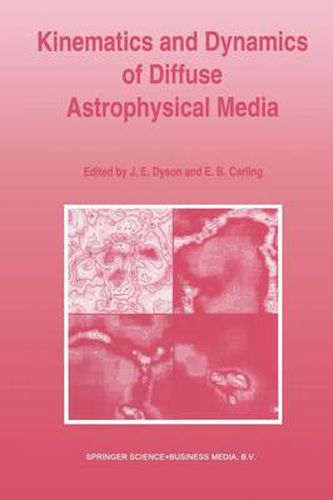Readings Newsletter
Become a Readings Member to make your shopping experience even easier.
Sign in or sign up for free!
You’re not far away from qualifying for FREE standard shipping within Australia
You’ve qualified for FREE standard shipping within Australia
The cart is loading…






This title is printed to order. This book may have been self-published. If so, we cannot guarantee the quality of the content. In the main most books will have gone through the editing process however some may not. We therefore suggest that you be aware of this before ordering this book. If in doubt check either the author or publisher’s details as we are unable to accept any returns unless they are faulty. Please contact us if you have any questions.
The area of diffuse astrophysical media is enormous and ranges over circum stellar to extragalactic scales. The physical conditions can vary from cool dusty gases to collections of relativistic particles. Flows in such media are set up by en ergy and momentum injection from winds, jets and explosions. The study of these phenomena involves physics, chemistry and, inevitably, hydrodynamics. One of the most important aspects of this study is the ever increasing overlap between theory and observation. Indeed, it can be argued that the only way to really understand these complex flows which can never be duplicated under terrestrial conditions, is to encourage this overlap, and this was one major aim of this Conference. Because of the long theoretical and observational association of the Manchester Group with this general area, Manchester seemed an appropriate venue for this Con ference. But in fact this long association and the actual year of the Conference are connected. In 1951 Franz Kahn joined the Astronomy Department at Manchester University and immediately the study of diffuse media, particularly the hydrody namic aspects, commenced and has flourished ever since. Franz became Head of the Astronomy Department in 1981 following the retirement of Professor Z. Kopal, who founded the Department and was instrumental in attracting Franz to it. In 1993, Franz retired from this position and a most serendipidous coincidence was his election to the Royal Society announced shortly before the Conference.
$9.00 standard shipping within Australia
FREE standard shipping within Australia for orders over $100.00
Express & International shipping calculated at checkout
This title is printed to order. This book may have been self-published. If so, we cannot guarantee the quality of the content. In the main most books will have gone through the editing process however some may not. We therefore suggest that you be aware of this before ordering this book. If in doubt check either the author or publisher’s details as we are unable to accept any returns unless they are faulty. Please contact us if you have any questions.
The area of diffuse astrophysical media is enormous and ranges over circum stellar to extragalactic scales. The physical conditions can vary from cool dusty gases to collections of relativistic particles. Flows in such media are set up by en ergy and momentum injection from winds, jets and explosions. The study of these phenomena involves physics, chemistry and, inevitably, hydrodynamics. One of the most important aspects of this study is the ever increasing overlap between theory and observation. Indeed, it can be argued that the only way to really understand these complex flows which can never be duplicated under terrestrial conditions, is to encourage this overlap, and this was one major aim of this Conference. Because of the long theoretical and observational association of the Manchester Group with this general area, Manchester seemed an appropriate venue for this Con ference. But in fact this long association and the actual year of the Conference are connected. In 1951 Franz Kahn joined the Astronomy Department at Manchester University and immediately the study of diffuse media, particularly the hydrody namic aspects, commenced and has flourished ever since. Franz became Head of the Astronomy Department in 1981 following the retirement of Professor Z. Kopal, who founded the Department and was instrumental in attracting Franz to it. In 1993, Franz retired from this position and a most serendipidous coincidence was his election to the Royal Society announced shortly before the Conference.